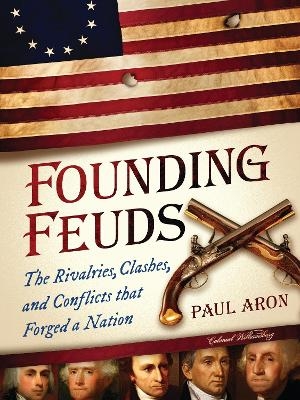
Founding Feuds
Sourcebooks, Inc (Verlag)
978-1-4926-3230-6 (ISBN)
- Keine Verlagsinformationen verfügbar
- Artikel merken
The Founding Fathers have been hailed for centuries as shining examples of men who put aside their own agendas to found a nation. But behind the scenes, there were more petty fights and fraught relationships than signatures on the Declaration of Independence.
From the violent brawl between Roger Griswold and Matthew Lyon in the halls of Congress, to George Washington’s battle against his slave Harry Washington, these less-discussed clashes bring to light the unpredictable and volatile nature of a constantly changing nation. Additionally, this gripping narrative delves deeper into the famous feuds, such as the fatal duel of Alexander Hamilton and Aaron Burr, and the many rivalries of Thomas Jefferson (which were as often personal as political.)
America’s great forbearers fought with each other as bitterly as our politicians do today. Founding Feuds reveals the true natures of the Founding Fathers and how their infighting shaped our nation as much as their cooperation, in fact sometimes even for the better.
Paul Aron is the Director of Publications for the Colonial Williamsburg Foundation. The author of the popular UNSOLVED MYSTERIES series, he was previously a reporter for the Virginia Gazette, executive editor at Simon and Schuster and editor at Doubleday.
CONTENTS
Preface
Silas Deane and Arthur Lee
Desperate for French arms, Congress sent Deane and Lee to Paris. The two seemed as eager to undercut each other as to cut a deal with the French.
George Washington and Harry Washington
Enslaved Harry Washington took care of George Washington's horses until Harry escaped from Mount Vernon. Harry's quest for freedom both paralleled and challenged George's.
Benjamin Lincoln and Daniel Shays
Just three years after the Revolutionary War ended, two patriot veterans again led forces into battle, this time against each other.
Patrick Henry and James Madison
The Revolution's greatest orator took on the father of the Constitution, with the fate of that document hanging in the balance.
Alexander Hamilton and Thomas Jefferson
So far apart were their views of what America ought to be that they were, as Jefferson put it, "daily pitted in the cabinet like two cocks."
John Adams and Thomas Jefferson
The great allies of 1776 were bitter enemies when they faced each other in the election of 1800.
John Adams and Alexander Hamilton
The two Federalist leaders so detested each other that in 1800, Hamilton preferred Jefferson over Adams, his own party's candidate.
Thomas Paine and George Washington
Washington generally stood above the fray of feuding founders. So it was surely startling when Paine-whose pen many equated to Washington's sword-explained that the president stood alone because he so easily betrayed his friends, including Paine.
Roger Griswold and Matthew Lyon
After Lyon, a Republican from Vermont, spit at Griswold, a Federalist from Connecticut, their fellow Congressmen witnessed a full-fledged brawl.
William Cobbett and Thomas Paine
Some of the nastiest feuds played out in newspapers and pamphlets. Cobbett often wrote under the byline of Porcupine; Paine referred to him as Skunk.
Aaron Burr and Alexander Hamilton
The founders insulted each other so much that it's surprising there weren't more duels. But when the vice president faced off against the former treasury secretary, the result was deadly.
Aaron Burr and Thomas Jefferson
The president insisted that his former vice president be tried for treason.
Thomas Jefferson and John Marshall
Jefferson and Marshall were cousins, and their feud was deeply personal. It was also a test of the balance of power between the branches of government the two represented.
Thomas Jefferson and John Randolph
Once a key ally of Jefferson in Congress, Randolph broke with Jefferson to lead a group of Republicans appalled by Jefferson's embrace of federal power.
Thomas Jefferson and Phillis Wheatley
Wheatley's poems impressed, among others, Washington and John Hancock. Not Jefferson, who could not conceive of an African American, let alone a former slave, writing poetry.
John Adams and Mercy Otis Warren
Adams did not like the way he was portrayed in Warren's history of the Revolution. His enraged letters to Warren and her indignant replies, while not as lengthy as her history, fill hundreds of pages.
Epilogue
Notes
Further Reading
Acknowledgments
Photo Credits
About the Author
About Colonial Williamsburg
| Erscheinungsdatum | 24.05.2016 |
|---|---|
| Verlagsort | Naperville |
| Sprache | englisch |
| Maße | 140 x 203 mm |
| Themenwelt | Sachbuch/Ratgeber ► Geschichte / Politik ► Allgemeines / Lexika |
| Geschichte ► Allgemeine Geschichte ► Neuzeit (bis 1918) | |
| Geisteswissenschaften ► Geschichte ► Regional- / Ländergeschichte | |
| Geschichte ► Teilgebiete der Geschichte ► Wirtschaftsgeschichte | |
| Sozialwissenschaften ► Politik / Verwaltung ► Politische Theorie | |
| ISBN-10 | 1-4926-3230-9 / 1492632309 |
| ISBN-13 | 978-1-4926-3230-6 / 9781492632306 |
| Zustand | Neuware |
| Haben Sie eine Frage zum Produkt? |
aus dem Bereich


